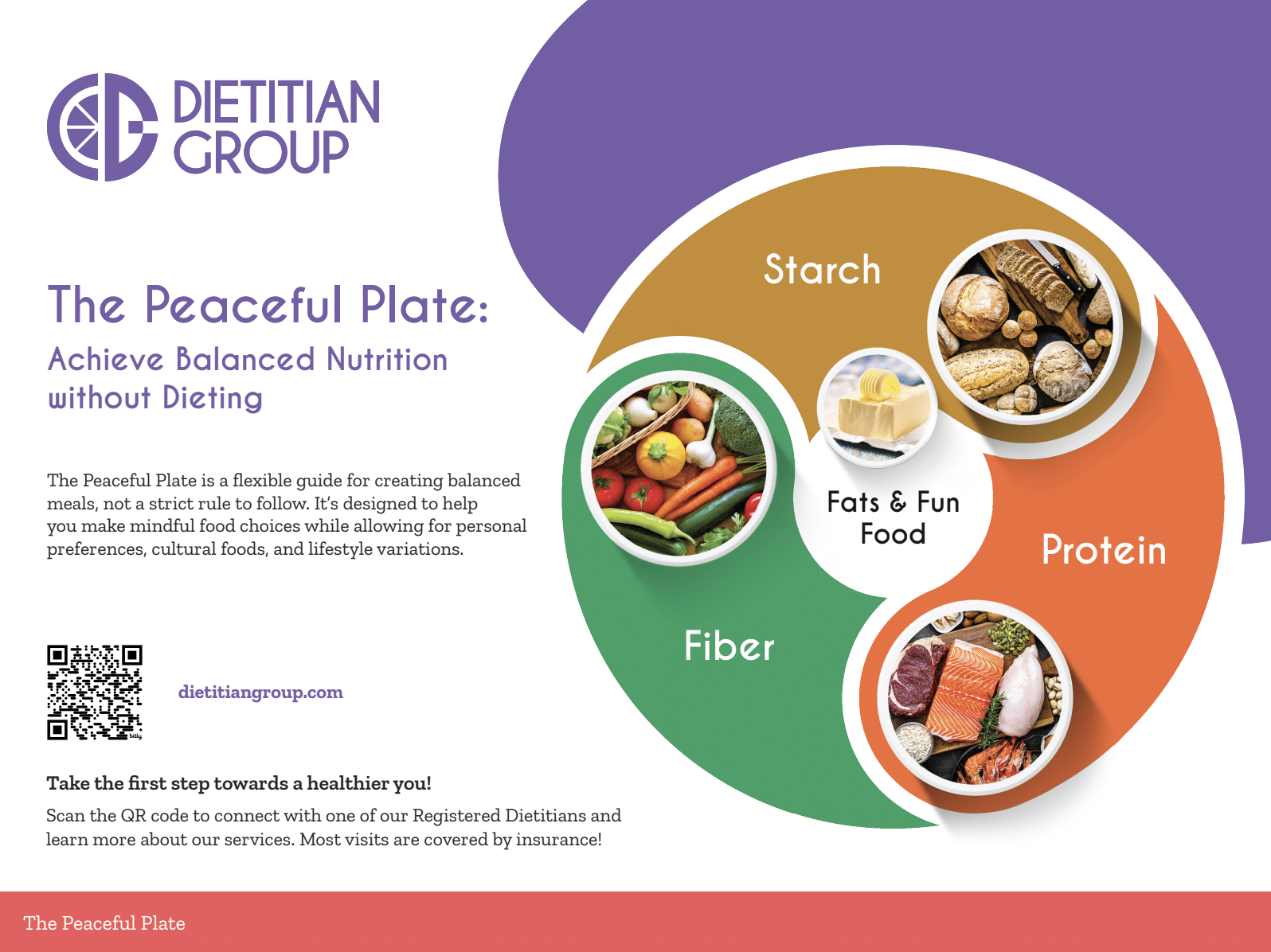Nutrition Counseling
For those frustrated that nutrition advice never translates to real life, our counseling techniques turn complex science into practical strategies that provide clear, adaptable solutions evolving with your lifestyle.
Dietitian Counseling Services
We understand how frustrating and confusing nutrition advice can be. You’re not alone in feeling like most guidance doesn’t fit your real life.
Dietitian Group’s nutrition counseling breaks through the noise of generic advice. We provide personalized, science-backed counseling that translates complex nutrition information into practical strategies tailored to your real life. Our approach adapts to your changing needs, turning nutrition guidance from a source of stress into a pathway of confidence and well-being..
Imagine a life where:
- Nutrition advice actually makes sense for your lifestyle
- You feel confident in your food choices
- Dietary strategies evolve with your changing needs
- Complex nutrition science becomes simple, actionable steps


What is Nutrition Counseling?
Nutrition counseling assesses a patient’s eating habits and overall health to identify nutritional deficits and goals and provide education to ensure they reach those goals. Most medical professionals consider nutrition counseling the first line of defense when managing and preventing a number of chronic diseases. Some of the chronic health issues that can affect and be affected by digestion and food absorption are cancer, kidney disease, and diabetes.
The nutritional assessment, past medical history, and patient goals will determine the frequency of monitoring. Consistent nutritional counseling is recommended for malnutrition in older adults and has been proven effective in managing diabetes.
How it Works
1. Set Your Appointment
Schedule initial consultation to begin your personalized journey
2. Discover Your Plan
Complete a comprehensive intake exploring your goals, history, and preferences to build a customized approach
3. Live Your Plan
Begin your personalized journey with regular check-ins that celebrate wins and adapt as your life evolves

Nutrition Guidance for Real Life

Breaking the Cycle of Nutrition Confusion
Traditional nutrition advice leaves you feeling overwhelmed and stuck. You’ve tried countless approaches, read endless articles, and still feel lost about what truly works for your body. Our counseling approach is different. We don’t just give you another set of rules – we help you understand the unique story of your nutrition, breaking through the noise of diet culture to create strategies that actually make sense for your life.

Practical Nutrition Strategies
Our registered dietitians take complex nutrition science and transform it into practical, actionable strategies that fit seamlessly into your daily routine. Whether you’re juggling a demanding career, managing a health condition, or simply wanting to feel more confident about your food choices, our counseling goes beyond generic advice. We create a personalized roadmap that adapts as your life changes.

Personalized Nutrition Guidance
Forget feeling like you’re the problem when diets fail. Our counseling process is a collaborative journey that honors your individual experiences, challenges, and goals. We dive deep into your relationship with food, exploring not just what you eat, but why you eat. This holistic approach means you’ll gain more than just nutrition knowledge – you’ll develop a sustainable, positive relationship with food that feels natural and empowering.

Continuous Dietary Support
Our nutrition counseling includes regular check-ins and adaptive strategies that grow with you. We’re not here to enforce rigid rules, but to provide ongoing support that helps you build confidence, make informed choices, and actually enjoy your approach to nutrition. Each session is an opportunity to celebrate your progress, address challenges, and refine your personalized nutrition strategy.

I felt overwhelmed trying to make sense of nutrition advice and how to fit healthy habits into my busy schedule. My dietitian, Stacy has provided us with different materials, tips, and strategies, that has helped us make everything feel manageable.
With her educating me on how to read food labels, I feel more confident, informed, and in control of my health. Whether it’s meal prep ideas, portion guidance, or just encouragement when you needed it, she is someone who truly listens, teaches, and cares.

Be Confident With Your Food Decisions
At Dietitian Group, we know you want to be a confident, healthy individual who understands nutrition. In order to do that, you need a counseling approach that truly speaks your language. The problem is that nutrition advice often feels complicated, rigid, and disconnected from your real life, which makes you feel frustrated and overwhelmed.
We believe nutrition counseling should be as unique as you are. We understand the challenges you face, which is why we’ve developed a personalized approach to nutrition guidance.
We’ll provide clear, adaptable nutrition solutions that grow and change with your lifestyle, ensuring ongoing support and practical guidance.
A Science-Backed Approach
to Balanced Nutrition Without Dieting
Nutrition shouldn’t be complicated. The Peaceful Plate Guide offers a straightforward, compassionate framework for nourishing your body and enjoying food without stress or restriction.
- Intuitive Eating Framework: A science-backed approach that helps you understand your body’s unique nutritional needs without strict rules.
- Flexible Meal Planning: Learn to create balanced meals that adapt to your lifestyle, preferences, and health goals.
- Holistic Nutrition Strategies: Discover how to support your mental and physical well-being through mindful eating techniques.
- Personalized Nutrition Guidance: Tools to help you build a positive, sustainable relationship with food that goes beyond traditional dieting.



